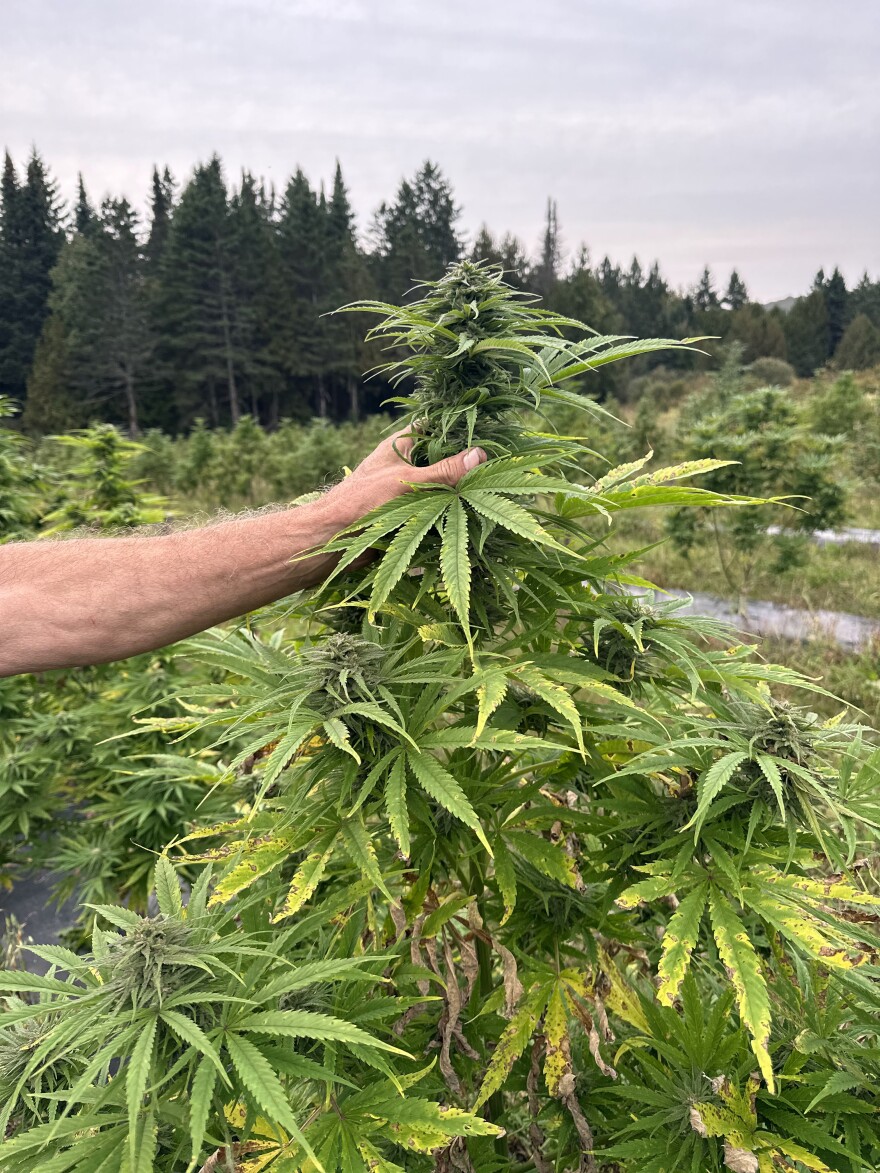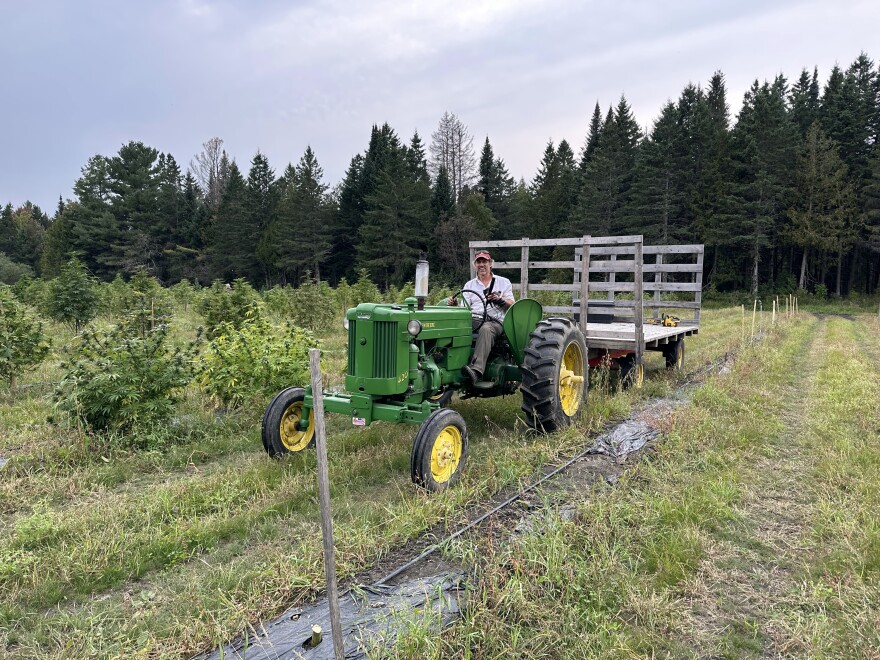John Rodgers runs a construction business in West Glover. He plows driveways, he runs properties, he’s a stonemason and, for 16 years, he served in the Vermont Legislature. Now, he grows cannabis on his farm, which used to be a dairy farm and which has been in his family for 200 years. Here’s John Rodgers:
This interview was produced for the ear. We highly recommend listening to the audio. We’ve also provided a transcript, which has been edited for length and clarity.
John Rodgers: Erdpurt Poison, Drip Queen, Goldmine Skunk, Skidder Trail, Tater Barrel, Groovy Banana, Dom P, Daddy Fat Sacks. Blue Dream! Yep!
Erica Heilman: That’s John Rodgers listing some of the varieties of weed he’s growing this year. John Rogers is a hipneck. And if I had to break it down, I would say that he’s about 35% hippie and 65% redneck. John is a fierce defender of same-sex marriage, he has more guns than anyone I’ve ever met, and he works harder than anyone I know. And his commitment to keeping his farm in the family and in farming is pretty exciting. There are so many farms going out in the state. Cows being sold off, farmland getting cut up, equipment auctioned off. I stood with John in an enormous barn of fresh cut weed, and we talked.
John Rodgers: So we’re in our 190-foot by 40-foot old dairy barn that we have converted and started growing hemp here in 2019. And now we have moved on to the adult-use market.
Erica Heilman: Is that what they call it?
John Rodgers: That’s what I call it. I don’t know what you call it. Pot, marijuana, weed market, I don’t know.
Erica Heilman: Sounds like the kind of thing where you might need a visitor log.
John Rodgers: Yes, you definitely need a visitor log. So what we do here is we take the nicest, biggest buds that will go into pre-rolls and into jars, the real pretty stuff, but a lot of the rest of the buds will go into biomass, which goes for distillate that we then sell to manufacturers for edibles, and tinctures and that kind of stuff.
Erica Heilman: There’s a lot of intensive handwork here, too.
John Rodgers: It’s tremendous. It’s worse than firewood. It’s like you have so many touches in these plants by the time you’re done, from getting your starters up and then putting your starters in the field and then basal pruning, and then you cut all the inner buds and inner branches out.
Erica Heilman: Good God.
John Rodgers: Smell it! How do you get that to your radio audience?
Erica Heilman: Smells like green, green weed.
John Rodgers: This one is very earthy. It’s a sativa that, it doesn’t put you to sleep. It’s more euphoric and uplifting. And if I’m going to smoke something — I don’t smoke a lot anymore — but if I’m gonna smoke something, I want something that I can have a couple of puffs on and keep working.
Erica Heilman: You want to feel like you can write the great American novel.
John Rodgers: You got it.
Erica Heilman: Why does it smell so good? What is it about my brain?
John Rodgers: Well, it’s all the same terpenes that are in the things that we’re around every day. Pinene is in pine trees. Limonene is in your citrus. So they’re familiar smells.
Erica Heilman: And is smell part of the thing that you’re invested in when you’re —
John Rodgers: It is, because smell, just like in food, smell is directly related to flavor.
Erica Heilman: It’s the terroir.
John Rodgers: It’s the terroir. It absolutely is. And I could grow this strain here and somebody in Rutland could grow this same strain, and it may taste and smell different because of the soil, because the soil is, you know, what’s feeding it. And that’s our business name, is Farmers Underground, which has many meanings. The underground farmers are the ones that kept this plant alive while our government tried to eradicate it from the face of the earth. But No. 2, the important work is being done underground. It’s all those little microorganisms and living creatures that are breaking down the organics in the soil. And that’s one thing that we’re super careful about is having healthy soil here.

John Rodgers: Look at the color of that thing.
Erica Heilman: It’s got purple —
John Rodgers: Isn’t it crazy? And pink, red —
Erica Heilman: It’s just like the picture of health.
John Rodgers: Oh it is. It’s gorgeous. And look, feel how dense it is.
Erica Heilman: Strong and sticky. OK, this strain is called what again?
John Rodgers: That one is Skidder Trail, which is my favorite name because that’s how a lot of people started growing, off the side of a skidder trail.
Erica Heilman: OK, so given that we’re standing in a vast field of weed, and you’re holding a bud. I mean, look, if it’s 1984, and you’re in high school —
John Rodgers: This is worth a million bucks. Right?
Erica Heilman: Right. How does the value of a bud change, now that you’re growing fields of it?
John Rodgers: You throw stuff away that would make people in the 1970s cry. Because I remember picking through stems and seeds and nasty shake for buds that weren’t anywhere near as big as that back in the day, right? But this is agriculture. This is not gardening. This is farming, and you have to get a different mentality. Otherwise, you’re not going to make it. It’s just, it’s too much work. You can’t save everything. You can’t do it. Right?
Erica Heilman: Do you worry about people stealing your weed?
John Rodgers: Well, I can hit the field with my .308. So, they may be able to run fast, but they can’t outrun my .308. Now, we got cameras, we got gates, we got motion sensor lights. But you know, we got a big black dog that barks at people, and I’m a pretty good shot.

Erica Heilman: This was your grandfather’s farm, too, right?
John Rodgers: Yup. My father, my grandfather.
Erica Heilman: And what would your grandfather think of what’s happening now?
John Rodgers: Oh he’d be thrilled. He’d be thrilled. He was always a bit of a rebel, anyways. And so, even if weed wasn’t legal, I think he’d be happy if we were paying for the farm with weed. But even better that it’s legal now. And we actually have the license that says we can do it. The real appeal to me is that if we do good this year, that my son may be able to quit his engineering job, which he doesn’t love. You know, it provides him a good life, but he doesn’t love being in an office. And so my objective in buying the family farm back in 2019 was to be able to be here. And so we’re hoping that by getting this going, that we’re going to be able to make enough income so that we can be farmers.



